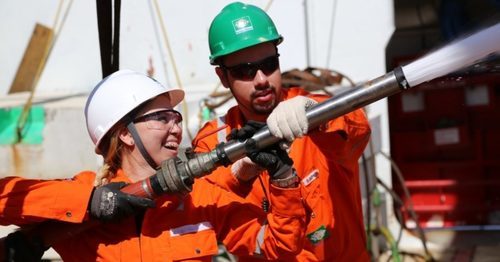ÐÎÑÑÈÉÑÊÈÉ ÏÐÎÔÅÑÑÈÎÍÀËÜÍÛÉ ÑÎÞÇ ÌÎÐßÊÎÂ
SEAFARERS' UNION OF RUSSIA
A NON-UNIONIZED SEAFARER
IS AN UNPROTECTED SEAFARER
Back
A new reduced list of prohibited professions for Russian women has entered into force

On January 1, an updated list of industries, jobs and positions with harmful and dangerous working conditions, in which the use of women's labor is restricted, came into force. The document was approved by the order of the Ministry of Labor of Russia No. 512n on July 18, 2019.The previous list included 456 items, but now there are only 100 of them left. The changes have concerned many industries, including shipping industry. For example, women can now work on deck that was previously prohibited, in particular as a boatswain, skipper, skipper’s mate and sailor on vessels of any type, as well as floating cleaning stations, docks, floating unloaders of grain, cement, coal and other dusty cargo. In addition, many other professions will become available to women.
For example, they will be able to work as drivers of cars with a load capacity of more than 2.5 tons, buses with more than 14 seats, as parachutists, electric train drivers, car repair locksmiths, coastal fishermen engaged in manual traction of seine nets and ice fishing on seine nets, tractor drivers, gas welders and electric welders of manual welding, working in closed containers and on high-rise communication structures over 10 meters and climbing works, etc. Nevertheless, a number of professions prohibited for women remained on the list. Many of them are related to chemical industries, underground and mining operations, metalworking, well drilling, oil and gas production, ferrous and non-ferrous metallurgy. Women will also not be able to be involved in direct fire fighting, cleaning and repairing the sewer network, diving work, as well as work related to lifting and moving heavy loads manually in case of exceeding the legally established norms. It should be noted that after the adoption of the order, the Ministry of Labor indicated in its message that the new list “removes restrictions for women on the following professions and jobs: a member of the ship's deck crew (boatswain, skipper, sailor), with the exception of work in the engine room of the ship."
«You can understand this as a ban on the work of the crewmembers in the ship's engine room, but this is not so, - said Natalia Bologova, head of the Department of Social and Labor Relations of the SUR». So the new list contains a section XXI "Production and work of other types of economic activity", which contains paragraph 78. It prohibits women from cleaning, scraping, painting, welding and carpentry work inside the ship’s and railway tanks, ship's liquid fuel tanks and oil tankers, cofferdams, fore-and afterpeakes, chain boxes, inter-bottom and inter-board spaces, aircraft fuel tanks, tanks, accumulator tanks, barges and other hard-to-reach places.
«The types of job listed in paragraph 78 related to the sea vessel refers to additional work which is performed by a crewmembers in their spare time and only with the personal consent of the seafarer, - added Bologova. –These are exactly what the Ministry of Labor had in mind when explaining the application of the new list».
We should add that the Seafarers Union of Russia (SUR) has long sought to revise the old list, which is currently outdated. In November 2016 at the VIII Congress of SUR was adopted a Resolution "On the violation of the right of women to work in the chosen occupation or profession in respect of their work as members of crews of sea and river fleet", which was later delivered to the Russian Government. The SUR offered to revise "list of industries, jobs and positions with harmful and dangerous working conditions", approved by the decree of the Government of the Russian Federation of 25 February 2000 No. 162 and to eliminate the position of members of crews of sea and river fleet from this list. This decision was largely driven by the story of Svetlana Medvedeva, who tried to get a job as a motorist-steerer for the Samara River Passenger Enterprise (SRPP), but was refused. The management of the company referred to the above mentioned list, as according to the results of the certification, the position of the motorist-steerer in the company did not meet the sanitary requirements for noise parameters. Svetlana defended her right to work for five long years and even filed a complaint with the UN Committee on the Elimination of Discrimination against Women, which took her side. It gave recommendations to the Government of the Russian Federation on the need to revise the list of prohibited professions which should be gender inclusive and related only to maternity protection, but then changes to the legislation were not followed. The court recognized the actions of the Samara River Passenger Enterprise (SRPP) as discriminatory, although it did not oblige the employer to hire Svetlana.
Various harmful factors do exist in many jobs and affect all people, regardless of their gender, SUR noted. The lists of prohibited professions for women have long outlived their usefulness. Instead of restricting their access to a particular job, more attention should be paid to creating a comfortable and safe working environment for all.
The Source: “Maritime News of Russia”, RBC
Up
